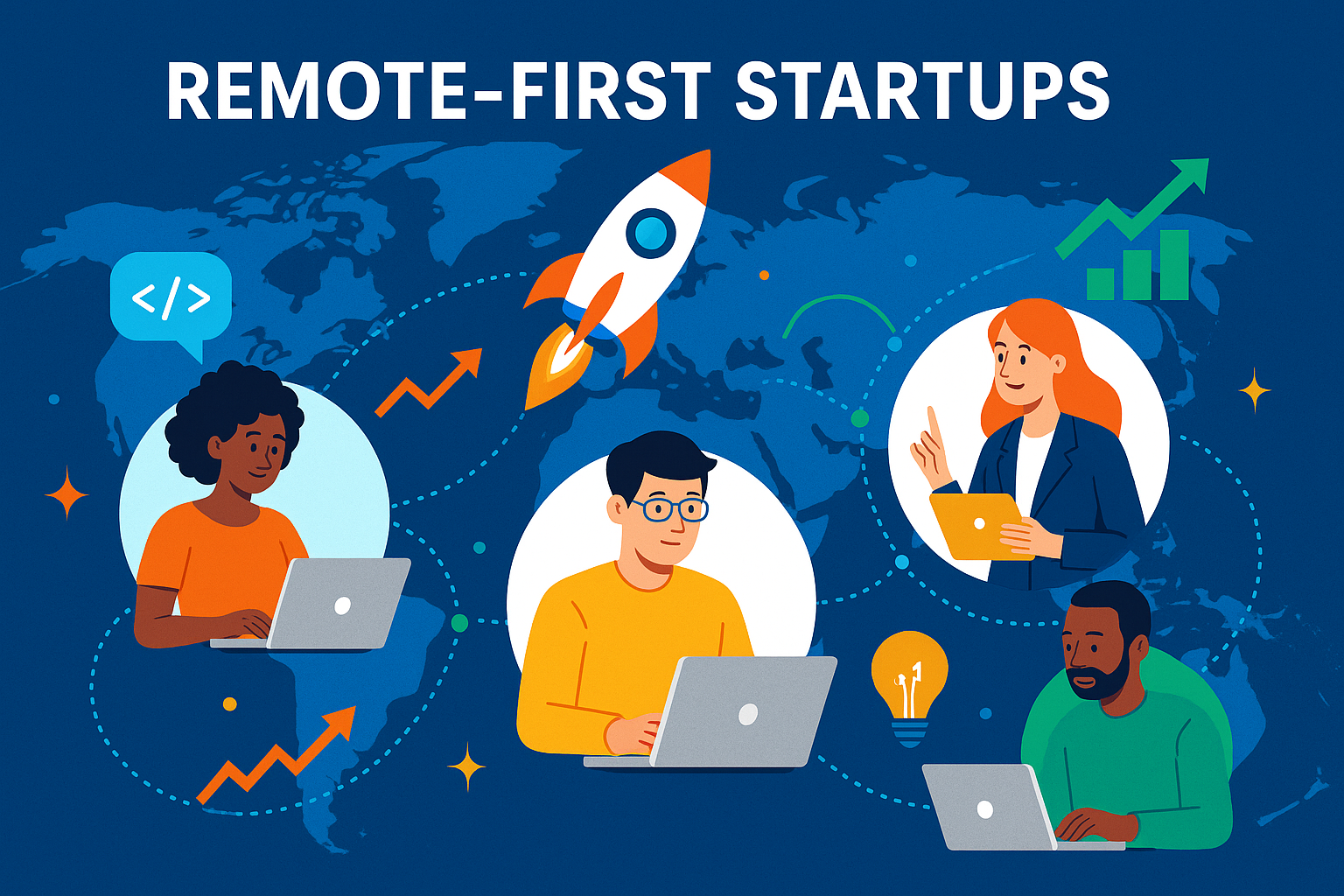Your basket is empty
Already have an account? Log in to check out faster.
Already have an account? Log in to check out faster.

The world of work is transforming, and so is the way businesses are being built. Startups—once associated with bustling coworking spaces, urban offices, and on-site collaboration—are now taking a new direction: remote-first from day one.
At GalleryHR, we believe this is not just a passing trend, but a fundamental shift in how modern companies will be launched and scaled—especially in Asia and the Arabic regions where innovation and ambition continue to rise.

🧠 What Does “Remote-First” Really Mean?
Being remote-first means a company is intentionally designed to operate with a distributed team, regardless of physical location. It is not just about “working from home”—it’s about building systems, culture, and operations where geography plays no role in how work gets done.
In contrast to “remote-friendly,” where remote work is optional or secondary, remote-first companies:
🚀 Why Are Startups Choosing This Model?
1. Talent Without Borders
Startups know that their success depends on great people. A remote-first model allows them to:
In growing startup scenes across Asia and the Arabic regions, founders are tapping into cross-border talent—developers in Southeast Asia, marketers in MENA, designers in Eastern Europe—all brought together under a unified vision.
2. Lower Costs, Higher Runway
Startups often operate on limited funding. Office space, relocation costs, and commuting allowances can drain resources early.
By going remote-first, founders can:
This approach enables more startups to bootstrap or delay raising external capital, increasing control and flexibility.
3. Agility and Speed
Remote-first teams are built to move fast. With a digital-first setup:
This agility allows startups to respond quickly to market shifts, user feedback, or new opportunities.
🌍 The Global Mindset from Day One
One major advantage of remote-first startups is that they think globally from the beginning. They’re not restricted to a single city or demographic. Instead, they:
This global mindset gives remote-first startups a competitive edge, especially when entering emerging digital economies across Asia and the Middle East.
📊 What the Data Tells Us
While many startups went remote out of necessity during global lockdowns, the results have been overwhelmingly positive:
Now, even post-pandemic, founders are intentionally designing their companies to stay remote-first—not as a short-term fix, but as a long-term growth strategy.

🛠️ How Remote-First Startups Succeed
To thrive in a remote-first environment, startups need to be intentional about their structure. Here's what successful ones do:
✅ 1. Build Digital Infrastructure Early
Startups use cloud-based project management, real-time communication, and documentation tools to stay connected. Everything lives online—from HR records to design assets.
✅ 2. Create Strong Communication Culture
They over-communicate, clarify expectations, and maintain transparency. Video check-ins, async updates, and shared dashboards keep everyone aligned.
✅ 3. Prioritize Results Over Hours
Remote-first teams focus on goals and outcomes—not time spent at a desk. This leads to better performance and healthier work-life balance.
✅ 4. Hire for Ownership and Autonomy
Startups look for self-driven talent—people who thrive in flexible, independent environments and take accountability without micromanagement.
✅ 5. Keep Culture Human and Inclusive
Despite physical distance, successful teams build connection through:
🌱 Remote-First Startups in Asia & the Arabic World
Across Asia and the Arabic regions, we’re seeing a new wave of entrepreneurs who are born global and digital. From fintech in Bahrain to health tech in Indonesia, founders are assembling teams across borders and building businesses with a remote-first backbone.
These startups are:
At GalleryHR, we’ve seen firsthand how this model is empowering lean startups to compete with larger enterprises—with less friction and more flexibility.
🔮 The Future Outlook: What Comes Next?
We believe that by the end of this decade, remote-first will become the default for the majority of early-stage startups. Why?
Because it offers:
Remote-first isn’t about avoiding offices—it’s about building smarter, more inclusive, and scalable companies.
As the next generation of founders emerges, especially from fast-growing innovation hubs in Asia and MENA, their businesses will reflect this new world: digital-first, globally minded, and human-focused.
💬 Final Thoughts
Why will 90% of startups in the future begin remote-first?
Because it’s faster, more inclusive, more cost-effective, and ultimately, more aligned with how the modern world works.
At GalleryHR, we are ready to support this future. Whether you’re a founder building your first team or a growing business expanding into new markets, we help you tap into global talent, establish compliant remote hiring practices, and create strong, connected distributed cultures.
The future is not just remote—it’s borderless. And it begins today.

Don’t miss this opportunity to upgrade your HR operations and join the growing list of businesses in Sri Lanka achieving success with GalleryHR.
GalleryHR is committed to helping Sri Lankan businesses thrive with smarter, more efficient HR solutions. Partner with us today and experience the difference.
Join our empire today!































0 comments